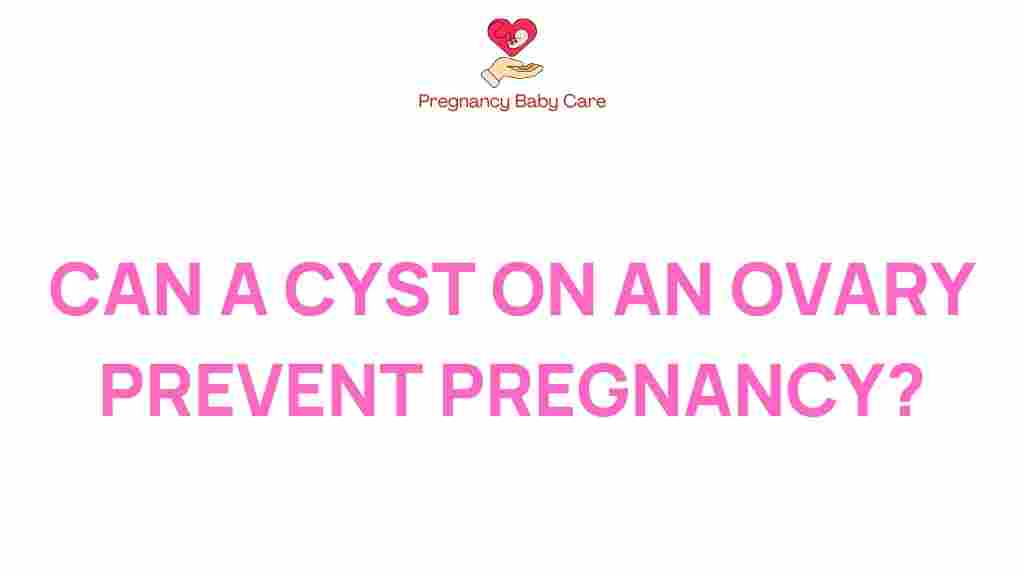Can an Ovarian Cyst Thwart Your Journey to Pregnancy?
For many women, the journey to pregnancy can be filled with excitement, anticipation, and sometimes, unexpected challenges. One such challenge that often raises concerns is the presence of an ovarian cyst. These fluid-filled sacs can occur on the ovaries, and while they are often benign and asymptomatic, they can potentially influence a woman’s fertility and reproductive health. In this article, we will explore how ovarian cysts can affect pregnancy, the symptoms to look out for, and what medical advice women should consider when facing these gynecological concerns.
Understanding Ovarian Cysts
Ovarian cysts are common among women of reproductive age. They can vary in size and type, and most women will develop one or more cysts at some point during their lives. Here are some important points about ovarian cysts:
- Most ovarian cysts are functional and come from normal ovulation processes.
- Cysts can be classified as follicular cysts, corpus luteum cysts, dermoid cysts, and endometriomas.
- Many cysts resolve on their own without treatment.
Do Ovarian Cysts Affect Pregnancy?
The presence of an ovarian cyst does not automatically mean that a woman will have trouble getting pregnant. However, certain types of cysts and their related symptoms can impact ovulation and overall fertility. Understanding the relationship between ovarian cysts and pregnancy is crucial for women trying to conceive.
Types of Ovarian Cysts and Their Impact on Fertility
There are various types of ovarian cysts, and their effects on fertility can differ:
- Functional Cysts: These are the most common and generally do not affect fertility. They form as part of the menstrual cycle and typically dissolve on their own.
- Endometriomas: These cysts are associated with endometriosis and can lead to ovulation issues. Women with endometriosis may experience challenges in conceiving.
- Polycystic Ovary Syndrome (PCOS): This condition is characterized by multiple small cysts on the ovaries and is a common cause of infertility due to hormonal imbalances that disrupt ovulation.
- Dermoid Cysts: These are rare and typically benign, but if they grow large, they may cause complications that could interfere with pregnancy.
Cyst Symptoms and When to Seek Medical Advice
Many women may not experience noticeable symptoms from ovarian cysts. However, some common cyst symptoms include:
- Bloating or swelling in the abdomen
- Pelvic pain, especially during menstruation
- Changes in menstrual cycle
- Pain during intercourse
- Frequent urination or difficulty emptying the bladder
If you experience any of these symptoms, particularly severe pain or discomfort, it is important to seek medical advice. Early diagnosis can help address any potential issues with your reproductive health and fertility.
How Ovarian Cysts Are Diagnosed
Healthcare providers typically diagnose ovarian cysts through:
- Pelvic Exam: A routine pelvic exam can help identify any abnormalities.
- Ultrasound: This imaging test provides a clearer picture of the cyst’s size and type.
- Blood Tests: Hormone levels can be checked to assess ovarian function.
Step-by-Step Process: Coping with Ovarian Cysts During Pregnancy Planning
If you are trying to conceive and have been diagnosed with an ovarian cyst, here’s a step-by-step process to navigate your concerns:
- Step 1: Monitor Your Cycle – Keep track of your menstrual cycle and any symptoms you experience. This information can be helpful for your healthcare provider.
- Step 2: Seek Medical Evaluation – Consult with a gynecologist or fertility specialist to discuss your situation and get a tailored assessment.
- Step 3: Follow Recommended Tests – Your doctor may recommend ultrasounds or blood tests to monitor the cyst and your hormone levels.
- Step 4: Discuss Treatment Options – Depending on the type of cyst, your doctor may suggest treatment options, which could range from watchful waiting to medication or surgery.
- Step 5: Focus on Overall Health – Maintain a healthy lifestyle, including a balanced diet and regular exercise, to support your reproductive health.
Troubleshooting Tips for Managing Cysts
While dealing with ovarian cysts, consider the following troubleshooting tips:
- Dietary Changes: Incorporate a diet rich in fruits, vegetables, and whole grains to support hormonal balance.
- Manage Stress: Practice stress-reduction techniques such as yoga, meditation, or deep-breathing exercises.
- Regular Check-Ups: Stay in touch with your healthcare provider to monitor any changes in your condition.
- Educate Yourself: Learn about your condition and stay informed about potential impacts on fertility.
While ovarian cysts can raise concerns regarding pregnancy and fertility, it is essential to understand that not all cysts will hinder your ability to conceive. Many women with cysts go on to have healthy pregnancies. By being proactive about your reproductive health, monitoring your symptoms, and seeking appropriate medical advice, you can navigate this journey with confidence. Remember, education and communication with your healthcare provider are key components in addressing any gynecological concerns.
For more detailed information on women’s health and reproductive issues, consider visiting this resource. If you have specific questions about your health, always consult with a healthcare professional.
Ultimately, understanding the intricacies of ovarian cysts and their potential implications on your journey to pregnancy can empower you to take informed steps towards achieving your family planning goals.
This article is in the category Pregnancy and created by PregnancyBabyCare Team
